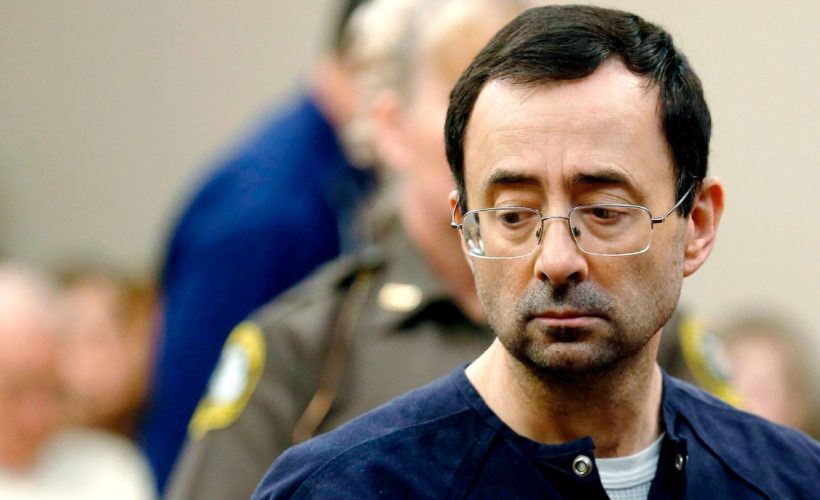Michigan State will pay $500 million to victims of Larry Nassar’s sexual abuse in what is believed to be the largest settlement ever in a sexual misconduct case involving a university.
Attorneys representing 332 claimants reached an agreement with representatives from Michigan State during a mediation meeting Tuesday afternoon. The university’s board of trustees agreed to the deal in principle. The settlement did not include provisions about policy or acknowledge the claims made against Michigan State.
Michigan State’s agreement stipulates that $425 million will be distributed to claimants who are currently part of the lawsuits. An allocator will determine how much each person will receive. The remaining $75 million will be held in reserve for two years in the event that others come forward and make claims about Nassar’s abuse.
“I’m very happy that we’re done with litigation,” said former gymnast Rachael Denhollander, the first woman to publicly accuse Nassar of sexual abuse more than 18 months ago. “I’m very grateful for the historic number that acknowledges some of the hardships that these women have suffered. I’m also very disappointed in a missed opportunity to create meaningful policy changes.”
As part of a plea deal, Nassar was sentenced to up to 175 years in state prison for criminal sexual conduct. More than 200 people provided victim impact statements at his sentencing hearings in January. He is currently serving a 60-year federal prison sentence after pleading guilty to child pornography charges.
The lawsuits claim that Nassar sexually abused his patients, many of them young female athletes, for more than two decades. They say that the other defendants had opportunities to put an end to Nassar’s abuse and failed to do so. They argued that those organizations were accountable for allowing the former doctor to prey on young women for as long as he did.
“This historic settlement came about through the bravery of more than 300 women and girls who had the courage to stand up and refuse to be silenced. We appreciate the diligent efforts of Mick Grewal and the survivors’ attorneys across the nation who worked to obtain this measure of justice and healing. We also thank the mediator and all who participated in crafting this settlement,” attorney John Manly said.
“It is the sincere hope of all of the survivors that the legacy of this settlement will be far-reaching institutional reform that will end the threat of sexual assault in sports, schools and throughout our society.”
Also named as defendants in the lawsuits are USA Gymnastics; the U.S. Olympic Committee; Twistars, a local gym where Nassar saw patients on a weekly basis; and specific individuals at some of those institutions. Those parties have not yet reached a settlement agreement.
“We’re not done,” attorney David Mittleman, who represents dozens of Nassar’s survivors, said. “This is an agreement that I think is in the best interest of all the parties and we look forward to continued dialogue with USAG, USOC and Twistars. We do believe they were enablers and complicit in allowing this to happen.”
Mittleman said there are no dates scheduled for future negotiations with those groups. He’s hopeful that the process will move faster now that Michigan State has reached a settlement, but he said he hasn’t seen the same level of motivation to finish the process quickly from those other parties.
Attorneys for both sides met this week in California to hash out the final details of the Michigan State agreement. Former federal judge Layn Phillips served as the mediator for these cases and held an initial meeting with both sides in New York last month.
The lawsuits claimed that several women raised concerns about Nassar by talking to other Michigan State employees as early as 1997, and that those employees did not properly report the claims.
Former gymnastics coach Kathie Klages retired shortly after she was suspended by the athletic department in February 2017. She was accused of discouraging former youth gymnast Larissa Boyce from filing an official report about Nassar’s behavior 20 year earlier. The university has started the process of firing William Strampel, a tenured professor and former dean of the medical school. As Nassar’s former boss, Strampel allowed the now-disgraced doctor to return to seeing patients while he remained under police investigation for a 2014 claim that eventually resulted in no charges. Strampel was himself charged with sexual misconduct and several other crimes earlier this year.
The school has also parted ways with former president Lou Anna Simon and former athletic director Mark Hollis during the fallout from the Nassar scandal. More than a half-dozen women say they tried to warn someone at Michigan State about Nassar’s abuse before he was arrested in September 2016.
“Michigan State is pleased that we have been able to agree in principle on a settlement that is fair to the survivors of Nassar’s crimes,” said Robert Young, special counsel to MSU. “We appreciate the hard work both sides put into the mediation, and the efforts of the mediator, which achieved a result that is responsible and equitable.”
The school has started to make changes to its Title IX policy and add to the resources it provides for those who say they were sexually abused on campus. A recent report conducted by a law firm for Michigan State said members of the campus community who were surveyed in the past year “overwhelmingly concluded that there is room for significant improvement” in how the university handles Title IX cases and educates its community members about sexual assault and relationship violence.
“From this point forward, I believe Michigan State is going to be an example of what to do in the event that [a scandal like Nassar] happens,” Mittleman said. “Hopefully, it helps to stop it from ever occurring again.”
Denhollander said she and the 15 to 20 other women who were at the settlement talks aren’t done fighting for change. She said the next step is to focus on changing laws that will make it easier to hold institutions and others accountable for sexual abuse.
Denhollander has been a driving force in a package of bills that is currently working its way through the legislative process in Michigan. The new laws, if passed by members of the House, would significantly extend the statute of limitations on civil sexual abuse cases and remove sovereign immunity protections from government-operated institutions like a university.
“The general tenor is that we’re not done yet,” Denhollander said.
Source:ESPN












